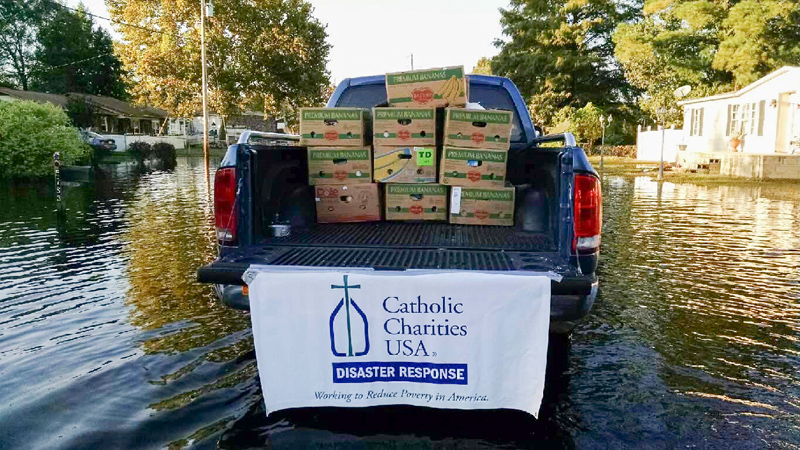
For more than a week, Brian Brown anxiously watched the waters of the rising Waccamaw River creep steadily higher through the Rosewood Estates subdivision in the Socastee community near Myrtle Beach.
He ended up with more than a foot of water in his garage, but thankfully, the rest of the house his family has called home for more than 20 years remained dry. He was more fortunate than many of his neighbors.
So Oct. 14, Brown volunteered to work alongside Catholic Charities and the Salvation Army, handing out boxes of nonperishable food, toiletries and cleaning supplies to people stuck in the flooded neighborhood.
It was a way of giving back, he said, a step along the path to some semblance of normalcy after stress and sadness brought on by the worst flooding to hit South Carolina in recent memory.
 “We’re here and we’re alive, so it’s important to try to help others,” Brown said.
“We’re here and we’re alive, so it’s important to try to help others,” Brown said.
He is just one of thousands of people beginning to rebuild.
The rains and flooding that started Oct. 1 left 19 people dead and cut a swath of destruction across the state. Homes, businesses, schools and churches were submerged or damaged. Hundreds of roads were washed out, making even the most basic transportation impossible in many areas.
Sixteen counties have been designated eligible for federal disaster assistance in the wake of the flooding: Berkeley, Calhoun, Charleston, Clarendon, Darlington, Dorchester, Florence, Georgetown, Horry, Kershaw, Lee, Lexington, Orangeburg, Richland, Sumter and Williamsburg.
Relief work and the rebuilding process are now in full swing around the Diocese of Charleston. Special collections are being taken up in parishes, and Bishop Robert E. Guglielmone has appointed Deacon Gabriel Cuervo, associate director of Catholic Charities, to help coordinate disaster recovery on the diocesan level.
Catholic Charities is on the frontline of relief efforts. Regional offices are working to collect supplies and assess what needs to be done after the flood waters recede.
Kelly Kaminski, regional coordinator for the Myrtle Beach Deanery office, said she received requests for help from Horry and Georgetown counties, plus people who traveled from as far away as Florence, Mullins and Darlington.
The Conway office provided space to store emergency food supplies from the Lowcountry Food Bank and worked with agencies to distribute hundreds of bags of staples. Bags were sent to North Myrtle Beach, Surfside Beach, the Bucksport community and other areas.
While food and basic supplies are still a necessity for many, Kaminski and other workers with the social outreach are also preparing for the long haul.
“Once the flooding stops, we want to focus on long-term case management, helping people get back into their homes and get their lives back on track,” Kaminski said. “When everybody else leaves, we’ll still be here because we’re invested in these areas.”
The Felician Center, an important social outreach in the Williamsburg County town of Kingstree, fared better than many places in the town, which was closed for several days because of severe flooding. The main building received some ceiling damage but was otherwise unscathed, according to Felician Sister Suzanne Dziedzic.
The center, like Catholic Charities, is preparing to work long-term with area families affected by the flooding, and has received offers of help and supplies from parishes across the country. Other Kingstree area churches, agencies and members of the community are also stepping up, Sister Suzanne said.
Elsewhere in the diocese, people of all ages lent a helping hand to their neighbors.
In Aiken, Cub Scout Pack 115 from St. Mary Help of Christians Church, heard about dozens of families in need at St. Joseph Church, an hour away in Columbia. The Scouts first worked with the American Red Cross in Aiken to collect thousands of bottles of water for all of Columbia, where citizens lived under a boil-water advisory for 10 days. When the call went out seeking supplies for St. Joseph, they worked with the church’s Venture Crew and Boy Scouts to gather hundreds of pounds of nonperishable food, toiletries, diapers, cleaning supplies and other items.
As of Oct. 17, Scout leader Joe Deskevich had delivered three truckloads of supplies to the Columbia church, where they were combined with more donated by St. Joseph parishioners and others.
“God decided this is how we were going to help,” Deskevich said. “We were here at the right time.”
Residents in the town of Bluffton, which wasn’t hit hard, gathered supplies for other areas. St. Gregory the Great School held a “Stuff the Bus” campaign beginning Oct. 6 to collect water, paper products and other supplies that were distributed statewide by the Bluffton Police Department. Principal Christopher Trott said parishioners and school families joined others in the community and collected enough supplies to fill the school’s bus three times, plus a parish minivan and a pickup truck.

